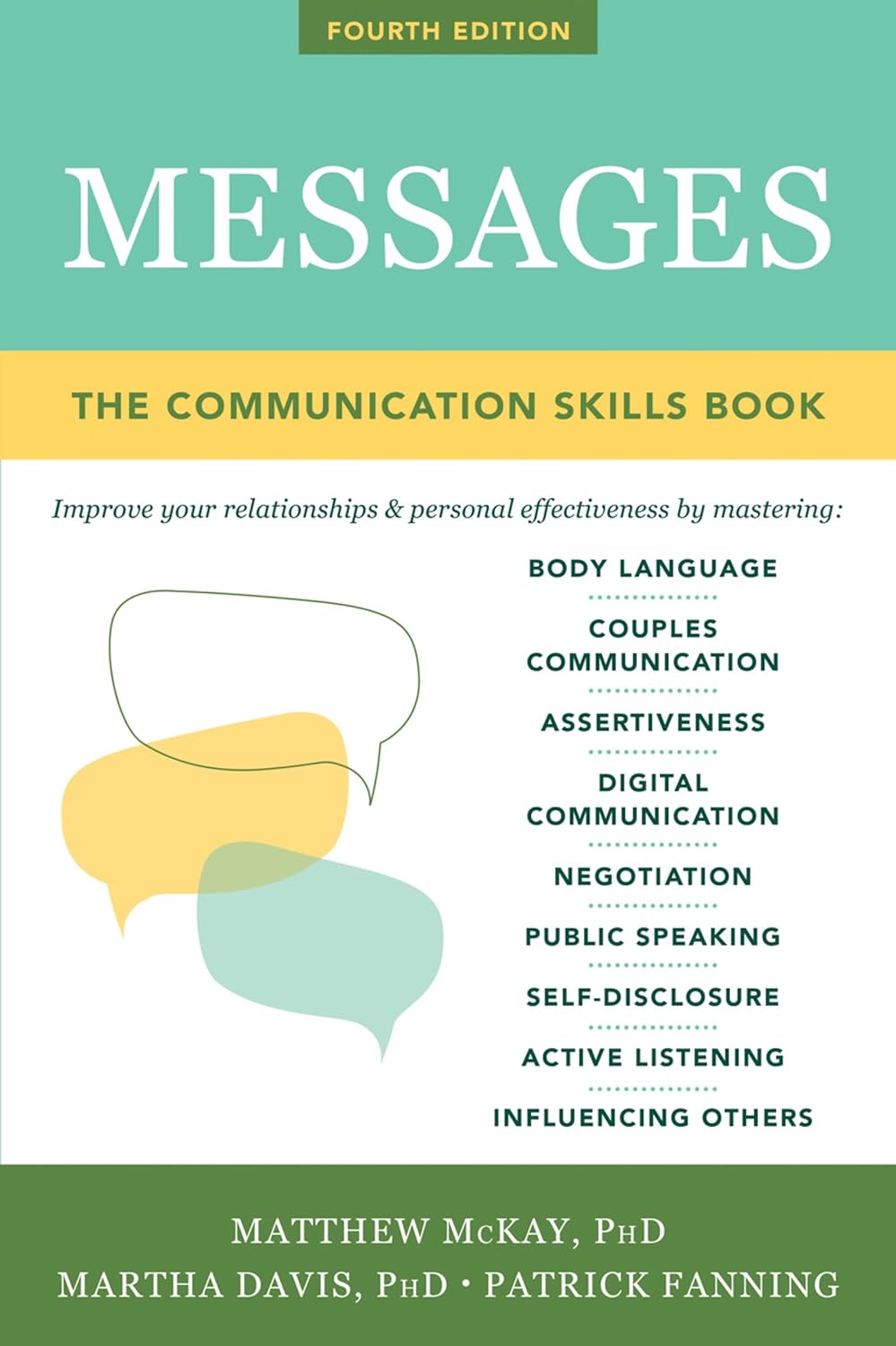
Messages: The Communications Skills Book
Many people assume that good communicators possess an intrinsic talent for speaking and listening to others, a gift that can’t be learned or improved. The reality is that communication skills are developed with deliberate effort and practice, and learning to understand others and communicate your ideas more clearly will improve every facet of your life.
Messages has already helped thousands of people build communication skills and cultivate better relationships with friends, family members, coworkers, and partners. With this fully revised and updated fourth edition, you’ll discover new skills to help you communicate your ideas more effectively and become a better listener. Learn how to:
Read body language
Develop skills for couples communication
Negotiate and resolve conflicts
Communicate with family members
Handle group interactions
Talk to children
Master public speaking
Prepare for job interviews
This new edition features a much-needed chapter on digital communication. Effective communication can easily be compromised when you’re not able to read your conversation partner’s body language, facial expression, or vocal tone. This chapter teaches you how to express yourself well via phone, email, texting, and video—all the skills you need to thrive in the digital age
My Account Info
Manage your Membership information, email preferences, and more.
Journals
Membership in ABCT grants you access to three journals.
Convention
We are now accepting Abstract submissions for Continuing Education Ticketed Sessions at the 2024 ABCT Convention in Philadelphia, PA.
My Account Info
Manage your Membership information, email preferences, and more.
Journals
Membership in ABCT grants you access to three journals.
Convention
We are now accepting Abstract submissions for Continuing Education Ticketed Sessions at the 2024 ABCT Convention in Philadelphia, PA.
Editorial Reviews
“In this fourth edition of Messages, the authors present the essentials of basic communication. From assertiveness and active listening skills to guidelines for digital communication and social media etiquette, every individual, couple, and therapist will benefit from this book. If you wish to deepen your connections to others and to succeed in every social interaction, this book is for you.”
—Michael A. Tompkins, PhD, ABPP, author of Anxiety and Avoidance and codirector of the San Francisco Bay Area Center for Cognitive Therapy
“Messages will be warmly and fully welcomed into my clinical practice. This straightforward, easy-to-digest, and wholly useful book on effective communication is completely fit for its purpose. Reading, working through the exercises, and practicing the advised skills could only move those engaged in the process in one direction—toward improved relationships. The plethora of communication process descriptions, exercises, styles, needs, and outcomes provide the reader with a thorough and integrated understanding of what it means to engage in effective communication in the service of connection. An excellent self-help workbook about enhancing how we relate messages to others!”
—Robyn D. Walser, PhD, codirector of the Bay Area Trauma Recovery Clinic; assistant professor at University of California, Berkeley; and coauthor of Learning ACT, The Mindful Couple, and other books
“This is an amazing book. The book will not only help you if you have been struggling to communicate effectively, but also if you just want to hone your skills. Using examples from all walks of life, the book explains the key aspects of effective communication and provides readers with ample opportunities to practice these skills in many different contexts. Although it is based on sound academic research, the book is by no means heavy academic reading. Offering many practical examples and illustrations to bring the content to life, the book is written in a non-technical, clear, concise, and personable style. I recommend this book without any reservations.”
—Georg H. Eifert, PhD, coauthor of The Mindfulness and Acceptance Workbook for Anxiety and Your Life on Purpose
“Messages is a must-read for any person looking to improve their communication skills; whether the reader needs to augment their relationship’s effectiveness with significant others, coworkers, supervisors, or relatives, this book offers ‘hands-on’ advice about how to effectively relate to others across different settings. All chapters have specific skills and exercises to master interpersonal skills beyond the classic teachings of using ‘I statements.’ I highly recommend it!”
—Patricia E. Zurita Ona, PsyD, East Bay Behavior Therapy Center, coauthor of Mind and Emotions, and author of Parenting a Troubled Teen and Escaping the Emotional Rollercoaster
About the Author(s)
Martha Davis
Martha Davis, Ph.D., was a psychologist in the department of psychiatry at Kaiser Permanente Medical Center in Santa Clara, CA, where she practiced individual, couple, and group psychotherapy for more than thirty years prior to her retirement. She is coauthor...
Read MoreMatthew McKay
Matthew McKay, Ph.D. is a professor at the Wright Institute in Berkeley, CA. He has authored and coauthored numerous books, including The Relaxation and Stress Reduction Workbook, Self-Esteem, Thoughts and Feelings, When Anger Hurts, and ACT on Life Not on...
Read MoreBack
